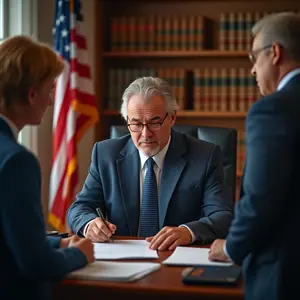Navigating the Labyrinth: A Practical Guide to Trust Litigation
Trust litigation: It may sound daunting, but with a clear understanding of the key players and their roles, you can navigate it with confidence. Think of it as a stage production with a diverse cast, each with their own motivations and responsibilities. Let’s meet the key characters:

- The Trustee: The director of this play. They’re in charge of managing the trust according to its script (the trust document). Their main gig? Acting in the best interest of the beneficiaries. This means handling assets wisely, making distributions as outlined, and keeping meticulous records. Sometimes, the trustees can become a character in the drama, either as a plaintiff or defendant.
- The Beneficiaries: The recipients of the trust’s bounty. They’re entitled to the benefits the trust offers. They also have rights: information about how the trust is being run, access to accountings, and the ability to hold the trustee accountable. They might take center stage in a lawsuit to protect their rights or challenge the trustee’s actions.
- The Heirs: These folks stand to inherit property from someone who passed away, especially if there’s no will. They might also be beneficiaries of the trust. Heirs can get involved in trust litigation if they’re disputing the trust’s validity or if its terms clash with inheritance laws. The deceased, although not physically present, can have a significant impact on the trust and its litigation, especially if their intentions or actions are being questioned.The Creditors: Consider those owed money by the deceased or the trust itself. They might enter the scene if the trust doesn’t have enough assets to cover its debts or if there’s a disagreement about the validity of their claims. The trustee has to balance the interests of the beneficiaries and the creditors.
The Attorneys: The legal eagles of the trust world. They represent the various parties, offering advice, drafting legal documents, negotiating settlements, and representing their clients in court. A good attorney is your trusted guide through the maze of trust litigation. Attorneys play a crucial role in trust litigation, providing legal counsel, advocating for their clients’ rights, and helping to navigate the complex legal processes involved.
The Probate Court: The stage where the drama unfolds. This is where trust litigation cases are heard and decided. The court interprets trust documents, which involves understanding the language and intent of the trust as written by the grantor, resolves disputes, and even removes or replaces trustees. They ensure trusts are handled according to the law and protect the beneficiaries’ interests.Now, let’s look at some real-world scenarios:
- Scenario 1: Misappropriation of Funds: A trustee managing a trust for their siblings is suspected of using trust funds to pay personal expenses. The beneficiaries, concerned about the dwindling assets, hire an attorney to investigate and potentially file a lawsuit to recover the funds and remove the trustee.
- Scenario 2: Disagreement Over Distribution: A trust specifies that assets should be distributed “equally” among the beneficiaries. However, the beneficiaries disagree on what “equally” means in practice – should it be a per capita distribution or based on family lines? They engage in mediation to reach a consensus, avoiding costly litigation.
- Scenario 3: Creditor Claim: A creditor files a claim against a trust, asserting that the deceased owed them money. The trustee carefully reviews the claim, seeking legal counsel to determine its validity. They negotiate with the creditor to reach a fair settlement while protecting the beneficiaries’ inheritance.
Key takeaways to avoid your own trust drama:
- Communication is Key: Open and honest communication between trustees and beneficiaries can prevent disagreements. Schedule regular meetings, provide clear and concise reports, and address concerns promptly.
- Documentation is Your Friend: Meticulous records are essential for trustees. For beneficiaries, keep records of communications and any concerns. Proper documentation can be crucial in resolving disputes.
- Seek Professional Help: Don’t go it alone. Attorneys specializing in trust litigation can provide invaluable guidance and protect your rights. Consult an attorney early to understand your options and responsibilities, even if you don’t anticipate problems.
- Explore Alternatives: Litigation can be costly and time-consuming. Consider mediation or arbitration as ways to resolve disputes more efficiently. These processes are often less adversarial and can preserve family relationships.
Proactive Trust Planning: The best way to avoid trust litigation is to have a well-drafted trust document. By working with an estate planning attorney to create a trust that clearly outlines your wishes and minimizes potential disputes, you can feel prepared and in control.Trust litigation can be complex, but with proactive planning, clear communication, and professional guidance, it’s possible to work towards a resolution that not only protects your interests but also preserves the integrity of the trust.
🔹 If you are in the San Diego area and need assistance with trust litigation or any other estate planning matters, contact Ted Cook, Trust Litigation Attorney, in Point Loma today for a consultation. His expertise can guide you through this complex process and help you protect your rights and interests.
Sources:
- California Courts Website: https://www.courts.ca.gov/selfhelp-probate.htm
- California Probate Code: https://leginfo.legislature.ca.gov/faces/codes_displaySection.xhtml?lawCode=PROB&sectionNum=17200
- CEB (Continuing Education of the Bar): California Trust and Probate Litigation: https://ceb.com/california-trust-and-probate-litigation/
